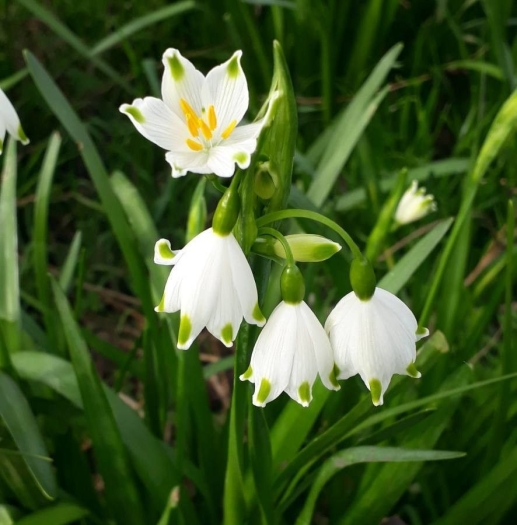Summer Snowflake
(Leucojum aestivum)
Summer Snowflake (Leucojum aestivum)
/
/

Tulpomania
CC BY-SA 4.0
Image By:
Tulpomania
Recorded By:
Copyright:
CC BY-SA 4.0
Copyright Notice:
Photo by: Tulpomania | License Type: CC BY-SA 4.0 | License URL: https://creativecommons.org/licenses/by-sa/4.0/ | Attribution: Tulpomania (cc-by-sa) | Rights Holder: Tulpomania | Publisher: PlantNet | Date Created: 2019-03-27T15:30:57Z | Title: Leucojum aestivum L.: flower | Notes: |





















































Estimated Native Range
Summary
Leucojum aestivum, commonly known as Summer Snowflake, is a perennial bulbous plant that typically grows 35–60 cm (14–24 in) tall. It is native to damp meadows, woodlands, and riverbanks across a wide range of Europe, from the British Isles to the Caucasus. The plant features graceful, nodding white flowers that resemble snowdrops, each with a green or yellowish spot at the tip of the petals. These pendant flowers appear in late spring, usually from April to May, and are borne in umbels of three to five, occasionally up to seven. The flowers are considered quite showy and are a highlight in the spring garden. After flowering, the plant produces capsule fruits that have flotation chambers, allowing them to be dispersed by water.
Summer Snowflake is valued for its attractive blooms and ability to naturalize in moist garden settings. It is often used in border plantings, naturalized areas, and as a part of woodland gardens. The plant thrives in full sun to part shade and prefers moist, well-drained soils, particularly clay. It can multiply quickly in favorable conditions, forming impressive clumps. While generally low-maintenance, it can be potentially invasive outside its native range, so gardeners should be cautious and check local guidelines before planting.CC BY-SA 4.0
Summer Snowflake is valued for its attractive blooms and ability to naturalize in moist garden settings. It is often used in border plantings, naturalized areas, and as a part of woodland gardens. The plant thrives in full sun to part shade and prefers moist, well-drained soils, particularly clay. It can multiply quickly in favorable conditions, forming impressive clumps. While generally low-maintenance, it can be potentially invasive outside its native range, so gardeners should be cautious and check local guidelines before planting.CC BY-SA 4.0
Plant Description
- Plant Type: Herb
- Height: 1-1.5 feet
- Width: 0.8-1 feet
- Growth Rate: Moderate
- Flower Color: Green, White
- Flowering Season: Spring
- Leaf Retention: Deciduous
Growth Requirements
- Sun: Full Sun, Part Shade
- Water: Medium
- Drainage: Slow, Medium, Fast
Common Uses
Bee Garden, Border Plant, Deer Resistant, Drought Tolerant, Fragrant, Groundcover, Low Maintenance, Potted Plant, Rabbit Resistant, Rock Garden, Showy Flowers, Street Planting, Water Garden
Natural Habitat
Native to damp meadows, woodlands, and riverbanks across Europe
Other Names
Common Names: Loddon-Lily, Sommer-Hvidblomme, Sommer-Knotenblume, Nivéole Dété, Zomerklokje, Sommarsnöklocka
Scientific Names: , Leucojum aestivum, Leucojum aestivum subsp. pulchellum, Leucojum pulchellum, Leucojum hernandezii, Leucojum aestivum var. pulchellum, Leucojum hernandezianum, Nivaria aestivalis, Nivaria monadelphia, Nivaria monodelpha
GBIF Accepted Name: Leucojum aestivum L.